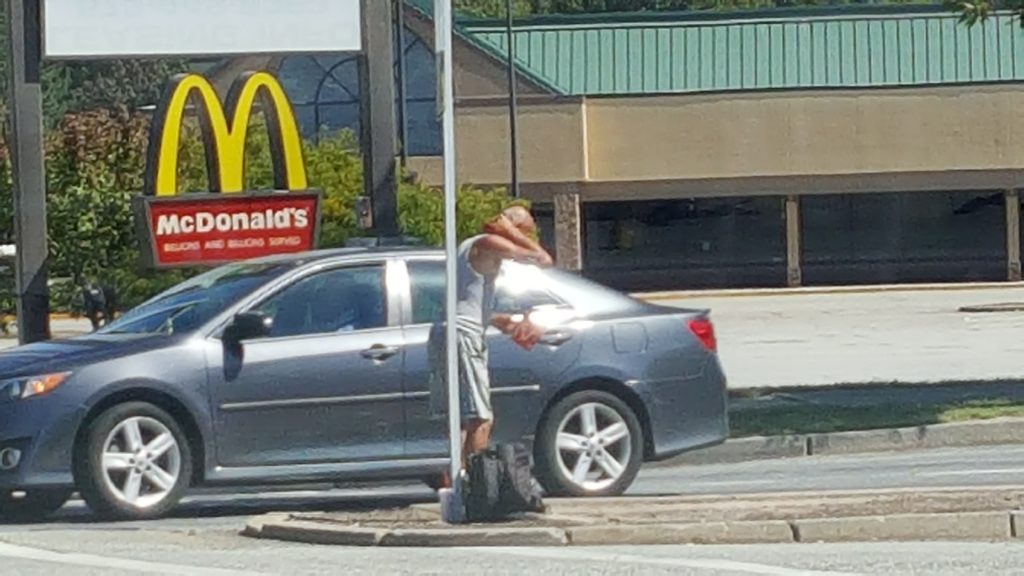Welcome to the Wakefield Doctrine (the theory of clarks, scotts and rogers)
Yeah, one of those Six Sentence Stories. In my (partial) defence I will say, this writing thing has become all about practicing. But then again, zoe, the curatoress of this collegial collection of curious and captivating life commentaries and observances (whew! ‘Mr Thesauras don’t fail me now!’) never said we couldn’t use this weekly Six Sentence Story to practice the craft. With the skills and imaginations of the participants here, one cannot help but become a better writer.
BArk
Like a slow-motion film of an avalanche on a snowy mountain side played in reverse, the approaching car begins to slow as it nears the exit, the number of cars entering the shopping center is nearly perfectly balanced with those leaving it. It is not perfectly balanced because cars are leaving more rapidly than they should, given the traffic conditions. It’s early afternoon, the sun is mercilessly bright and over-bearing, if for no other reason than in September it has no competition from summer-afternoon shower clouds and is every bit the schoolyard bully when the teacher, suddenly called back into the colored-constuction-paper prison of brick and linoleum, leaves her young charges un-guarded.
He sees himself in the shinyhard-glass windows, safely slid up, reflected in the averted eyes of the drivers and feels a memory stir, the figure etched in coated glass familiar, but barely recognizable.The window is down on one approaching car and from the back seat a dog barks a warning, head and forward-leaning ears projecting from the opening of the still moving vehicle.
As the car draws abreast, the driver looks away, the dog stares curiously, tongue now lolling and relaxed and does not bark, the man stares back and sees the acknowledgment of his presence in the simplest of terms, one life to another, the dog does not judge and the man feels the echo of a memory stir, the car moves out into traffic, the dog maintaining eye contact until the car turns away and the man turns back to face his shrunken world.


 About clarkscottroger
About clarkscottroger
I am one of those prople who wonder what dogs are thinking.
and I totally believe that they are/do….think or, at least are self-aware
I also wonder what dogs are thinking, yet sometimes I think I don’t really want to know! Some things are best unknown. :)
I believe it’s possible for a being (in this case, a dog) to be self-aware but, probably framed in a context that would surely be quite different from what we humans exist.
Hmmm…sounds like a clark in that car. :)
And I love all the descriptors! Writing Almira is changing your writing…it’s really eloquent! Nicely done! :)
thank you very much, Cyntharita!
I love the underlying thoughts here, the dog accepting of the stranger, the driver averting his gaze, and the man standing there recalling perhaps another chapter of his life far different from the place where he finds himself now. Great read!
yeah. it’s weird how all that can connect within while sitting for all of 2 minutes as I did at the traffic light (the photo on the post).
It is difficult for me to understand sometimes why people turn their gazes instead of simply smiling, acknowledging the humanity of the person standing there.
I can feel (how they feel) there is (for me) a sense of projectile empathy, yet, when it is conjoined with my own (emotional) avoidance, I suspect I get a negative vibe and refuse to become part of the spectacle. weird, huh?
Two souls acknowledge each other and connect…and then it’s gone. And I *love* flash fiction for writing practice. I’ve found I can often cobble a whole bunch of small flashes into a decent short story. :-)
I look forward to Thursday and zoe’s ‘hop
All the practice is paying off!
Awesome story!!!
Thank you, Miz Campbell
I like the element of the fleeting connection, the brief moment when two lives intersect and then no longer do. Always interesting to speculate how much weight those small moments carry.
I would maintain the they have the (potential) to no only carry weight, but to shape the world…. I mean.. when you try to measure, how close to being does it take to be “that’s what really should have happened?”